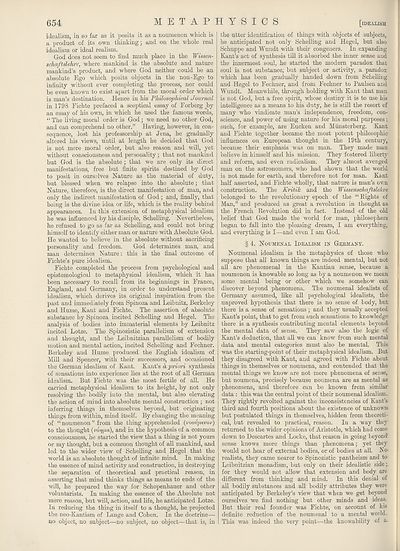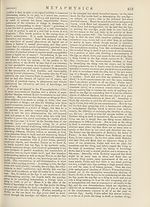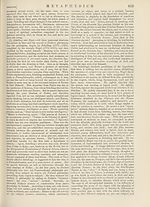New volumes of the Encyclopædia Britannica > Volume 30, K-MOR
(698) Page 654
Download files
Complete book:
Individual page:
Thumbnail gallery: Grid view | List view

654
idealism, in so far as it posits it as a noumenon which is
a product of its own thinking; and on the whole real
idealism or ideal realism.
God does not seem to find much place in the Wissen-
schaftslehre, where mankind is the absolute and nature
mankind’s product, and where God neither could be an
absolute Ego which posits objects in the non-Ego to
infinity without ever completing the process, nor could
be even known to exist apart from the moral order which
is man’s destination. Hence in his Philosophical Journal
in 1798 Fichte prefaced a sceptical essay of Forberg jby
an essay of his own, in which he used the famous words,
“ The living moral order is God; we need no other God,
and can comprehend no other.” Having, however, in con¬
sequence, lost his professorship at Jena, he gradually
altered his views, until at length he decided that God
is not mere moral order, but also reason and will, yet
without consciousness and personality; that not mankind
but God is the absolute ; that we are only its direct
manifestations, free but finite spirits destined by God
to posit in ourselves Nature as the material of duty,
but blessed when we relapse into the absolute; that
Nature, therefore, is the direct manifestation of man, and
only the indirect manifestation of God ; and, finally, that
being is the divine idea or life, which is the reality behind
appearances. In this extension of metaphysical idealism
he was influenced by his disciple, Schelling. Nevertheless,
he refused to go as far as Schelling, and could not bring
himself to identify either man or nature with Absolute God.
He wanted to believe in the absolute without sacrificing
personality and freedom. God determines man, and
man determines Nature: this is the final outcome of
Fichte’s pure idealism.
Fichte completed the process from psychological and
epistemological to metaphysical idealism, which it has
been necessary to recall from its beginnings in France,
England, and Germany, in order to understand present
idealism, wdiieh derives its original inspiration from the
past and immediately from Spinoza and Leibnitz, Berkeley
and Hume, Kant and Fichte. The assertion of absolute
substance by Spinoza incited Schelling and Hegel. The
analysis of bodies into immaterial elements by Leibnitz
incited Lotze. The Spinozistic parallelism of extension
and thought, and the Leibnitzian parallelism of bodily
motion and mental action, incited Schelling and Fechner.
Berkeley and Hume produced the English idealism of
Mill and Spencer, with their successors, and occasioned
the German idealism of Kant. Kant’s a priori synthesis
of sensations into experience lies at the root of all German
idealism. But Fichte was the most fertile of all. He
carried metaphysical idealism to its height, by not only
resolving the bodily into the mental, but also elevating
the action of mind into absolute mental construction; not
inferring things in themselves beyond, but originating
things from within, mind itself. By changing the meaning
of “ noumenon ” from the thing apprehended (voov/xevov)
to the thought (voij/ia), and in the hypothesis of a common
consciousness, he started the view that a thing is not yours
or my thought, but a common thought of all mankind, and
led to the wider view of Schelling and Hegel that the
world is an absolute thought of infinite mind. In making
the essence of mind activity and construction, in destroying
the separation of theoretical and practical reason, in
asserting that mind thinks things as means to ends of the
will, he prepared the way for Schopenhauer and other
voluntarists. In making the essence of the Absolute not
mere reason, but will, action, and life, he anticipated Lotze.
In reducing the thing in itself to a thought, he projected
the neo-Kantism of Lange and Cohen. In the doctrine-
no object, no subject—no subject, no object—that is, in
[idealism
the utter identification of things with objects of subjects,
he anticipated not only Schelling and Hegel, but also
Schuppe and Wundt with their congeners. In expanding
Kant’s act of synthesis till it absorbed the inner sense and
the innermost soul, he started the modern paradox that
soul is not substance, but subject or activity, a paradox
which has been gradually handed down from Schelling
and Hegel to Fechner, and from Fechner to Paulsen and
Wundt. Meanwhile, through holding with Kant that man
is not God, but a free spirit, whose destiny it is to use bis
intelligence as a means to his duty, he is still the resort of
many who vindicate man’s independence, freedom, con¬
science, and power of using nature for his moral purposes:
such, for example, are Eucken and Munsterberg. Kant
and Fichte together became the most potent philosophic
influences on European thought in the 19th century,
because their emphasis wTas on man. They made man
believe in himself and his mission. They fostered liberty
and reform, and even radicalism. They almost avenged
man on the astronomers, who had shown that the world
is not made for earth, and therefore not for man. Kant
half asserted, and Fichte wholly, that nature is man’s own
construction. The Kritik and the Wissenschaftslehre
belonged to the revolutionary epoch of the “ Bights of
Man,” and produced as great a revolution in thought as
the French Kevolution did in fact. Instead of the old
belief that God made the world for man, philosophers
began to fall into the pleasing dream, I am everything,
and everything is I—and even I am God.
§ 4. Noumenal Idealism in Germany.
Noumenal idealism is the metaphysics of those who
suppose that all known things are indeed mental, but not
all are phenomenal in the Kantian sense, because a
noumenon is knowable so long as by a noumenon we mean
some mental being or other which we somehow can
discover beyond phenomena. The noumenal idealists of
Germany assumed, like all psychological idealists, the
unproved hypothesis that there is no sense of body, but.
there is a sense of sensations; and they usually accepted
Kant’s point, that to get from such sensations to knowledge-
there is a synthesis contributing mental elements beyond
the mental data of sense. They saw also the logic of
Kant’s deduction, that all we can know from such mental
data and mental categories must also be mental. This
was the starting-point of their metaphysical idealism. But
they disagreed with Kant, and agreed with Fichte about
things in themselves or noumena, and contended that the
mental things we know are not mere phenomena of sense,
but noumena, precisely because noumena are as mental as
phenomena, and therefore can be known from similar
data : this was the central point of their noumenal idealism.
They rightly revolted against the inconsistencies of Kant’s
third and fourth positions about the existence of unknown
but postulated things in themselves, hidden from theoreti¬
cal, but revealed to practical, reason. In a way they
returned to the wider opinions of Aristotle, which had come
down to Descartes and Locke, that reason in going beyond1
sense knows more things than phenomena; yet they
would not hear of external bodies, or of bodies at all. No>
realists, they came nearer to Spinozistic pantheism and to
Leibnitzian monadism, but only on their idealistic side
for they would not allow that extension and body are
different from thinking and mind. In this denial of
all bodily substances and all bodily attributes they were
anticipated by Berkeley’s view that when we get beyond
ourselves we find nothing but other minds and ideas.
But their real founder was Fichte, on account of Ins
definite reduction of the noumenal to a mental world.
This was indeed the very point—the knowability of a.
METAPHYSICS
idealism, in so far as it posits it as a noumenon which is
a product of its own thinking; and on the whole real
idealism or ideal realism.
God does not seem to find much place in the Wissen-
schaftslehre, where mankind is the absolute and nature
mankind’s product, and where God neither could be an
absolute Ego which posits objects in the non-Ego to
infinity without ever completing the process, nor could
be even known to exist apart from the moral order which
is man’s destination. Hence in his Philosophical Journal
in 1798 Fichte prefaced a sceptical essay of Forberg jby
an essay of his own, in which he used the famous words,
“ The living moral order is God; we need no other God,
and can comprehend no other.” Having, however, in con¬
sequence, lost his professorship at Jena, he gradually
altered his views, until at length he decided that God
is not mere moral order, but also reason and will, yet
without consciousness and personality; that not mankind
but God is the absolute ; that we are only its direct
manifestations, free but finite spirits destined by God
to posit in ourselves Nature as the material of duty,
but blessed when we relapse into the absolute; that
Nature, therefore, is the direct manifestation of man, and
only the indirect manifestation of God ; and, finally, that
being is the divine idea or life, which is the reality behind
appearances. In this extension of metaphysical idealism
he was influenced by his disciple, Schelling. Nevertheless,
he refused to go as far as Schelling, and could not bring
himself to identify either man or nature with Absolute God.
He wanted to believe in the absolute without sacrificing
personality and freedom. God determines man, and
man determines Nature: this is the final outcome of
Fichte’s pure idealism.
Fichte completed the process from psychological and
epistemological to metaphysical idealism, which it has
been necessary to recall from its beginnings in France,
England, and Germany, in order to understand present
idealism, wdiieh derives its original inspiration from the
past and immediately from Spinoza and Leibnitz, Berkeley
and Hume, Kant and Fichte. The assertion of absolute
substance by Spinoza incited Schelling and Hegel. The
analysis of bodies into immaterial elements by Leibnitz
incited Lotze. The Spinozistic parallelism of extension
and thought, and the Leibnitzian parallelism of bodily
motion and mental action, incited Schelling and Fechner.
Berkeley and Hume produced the English idealism of
Mill and Spencer, with their successors, and occasioned
the German idealism of Kant. Kant’s a priori synthesis
of sensations into experience lies at the root of all German
idealism. But Fichte was the most fertile of all. He
carried metaphysical idealism to its height, by not only
resolving the bodily into the mental, but also elevating
the action of mind into absolute mental construction; not
inferring things in themselves beyond, but originating
things from within, mind itself. By changing the meaning
of “ noumenon ” from the thing apprehended (voov/xevov)
to the thought (voij/ia), and in the hypothesis of a common
consciousness, he started the view that a thing is not yours
or my thought, but a common thought of all mankind, and
led to the wider view of Schelling and Hegel that the
world is an absolute thought of infinite mind. In making
the essence of mind activity and construction, in destroying
the separation of theoretical and practical reason, in
asserting that mind thinks things as means to ends of the
will, he prepared the way for Schopenhauer and other
voluntarists. In making the essence of the Absolute not
mere reason, but will, action, and life, he anticipated Lotze.
In reducing the thing in itself to a thought, he projected
the neo-Kantism of Lange and Cohen. In the doctrine-
no object, no subject—no subject, no object—that is, in
[idealism
the utter identification of things with objects of subjects,
he anticipated not only Schelling and Hegel, but also
Schuppe and Wundt with their congeners. In expanding
Kant’s act of synthesis till it absorbed the inner sense and
the innermost soul, he started the modern paradox that
soul is not substance, but subject or activity, a paradox
which has been gradually handed down from Schelling
and Hegel to Fechner, and from Fechner to Paulsen and
Wundt. Meanwhile, through holding with Kant that man
is not God, but a free spirit, whose destiny it is to use bis
intelligence as a means to his duty, he is still the resort of
many who vindicate man’s independence, freedom, con¬
science, and power of using nature for his moral purposes:
such, for example, are Eucken and Munsterberg. Kant
and Fichte together became the most potent philosophic
influences on European thought in the 19th century,
because their emphasis wTas on man. They made man
believe in himself and his mission. They fostered liberty
and reform, and even radicalism. They almost avenged
man on the astronomers, who had shown that the world
is not made for earth, and therefore not for man. Kant
half asserted, and Fichte wholly, that nature is man’s own
construction. The Kritik and the Wissenschaftslehre
belonged to the revolutionary epoch of the “ Bights of
Man,” and produced as great a revolution in thought as
the French Kevolution did in fact. Instead of the old
belief that God made the world for man, philosophers
began to fall into the pleasing dream, I am everything,
and everything is I—and even I am God.
§ 4. Noumenal Idealism in Germany.
Noumenal idealism is the metaphysics of those who
suppose that all known things are indeed mental, but not
all are phenomenal in the Kantian sense, because a
noumenon is knowable so long as by a noumenon we mean
some mental being or other which we somehow can
discover beyond phenomena. The noumenal idealists of
Germany assumed, like all psychological idealists, the
unproved hypothesis that there is no sense of body, but.
there is a sense of sensations; and they usually accepted
Kant’s point, that to get from such sensations to knowledge-
there is a synthesis contributing mental elements beyond
the mental data of sense. They saw also the logic of
Kant’s deduction, that all we can know from such mental
data and mental categories must also be mental. This
was the starting-point of their metaphysical idealism. But
they disagreed with Kant, and agreed with Fichte about
things in themselves or noumena, and contended that the
mental things we know are not mere phenomena of sense,
but noumena, precisely because noumena are as mental as
phenomena, and therefore can be known from similar
data : this was the central point of their noumenal idealism.
They rightly revolted against the inconsistencies of Kant’s
third and fourth positions about the existence of unknown
but postulated things in themselves, hidden from theoreti¬
cal, but revealed to practical, reason. In a way they
returned to the wider opinions of Aristotle, which had come
down to Descartes and Locke, that reason in going beyond1
sense knows more things than phenomena; yet they
would not hear of external bodies, or of bodies at all. No>
realists, they came nearer to Spinozistic pantheism and to
Leibnitzian monadism, but only on their idealistic side
for they would not allow that extension and body are
different from thinking and mind. In this denial of
all bodily substances and all bodily attributes they were
anticipated by Berkeley’s view that when we get beyond
ourselves we find nothing but other minds and ideas.
But their real founder was Fichte, on account of Ins
definite reduction of the noumenal to a mental world.
This was indeed the very point—the knowability of a.
METAPHYSICS
Set display mode to:
![]() Universal Viewer |
Universal Viewer | ![]() Mirador |
Large image | Transcription
Mirador |
Large image | Transcription
Images and transcriptions on this page, including medium image downloads, may be used under the Creative Commons Attribution 4.0 International Licence unless otherwise stated. ![]()
| Encyclopaedia Britannica > New volumes of the Encyclopædia Britannica > Volume 30, K-MOR > (698) Page 654 |
|---|
| Permanent URL | https://digital.nls.uk/193576575 |
|---|
| Attribution and copyright: |
|
|---|---|
| Shelfmark | EB.18 |
|---|---|
| Description | Ten editions of 'Encyclopaedia Britannica', issued from 1768-1903, in 231 volumes. Originally issued in 100 weekly parts (3 volumes) between 1768 and 1771 by publishers: Colin Macfarquhar and Andrew Bell (Edinburgh); editor: William Smellie: engraver: Andrew Bell. Expanded editions in the 19th century featured more volumes and contributions from leading experts in their fields. Managed and published in Edinburgh up to the 9th edition (25 volumes, from 1875-1889); the 10th edition (1902-1903) re-issued the 9th edition, with 11 supplementary volumes. |
|---|---|
| Additional NLS resources: |
|

